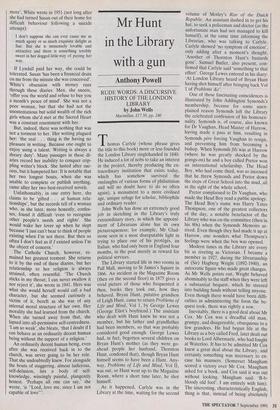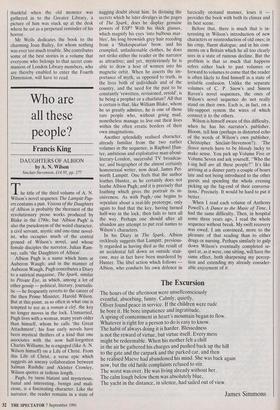Mr Hunt in the Library with a gun
Anthony Powell
RUDE WORDS: A DISCURSIVE HISTORY OF THE LONDON LIBRARY by John Wells
Macmillan, £17.50, pp. 240
Thomas Carlyle (whose phrase gives the title to this book) more or less founded the London Library singlehanded in 1840. He induced a lot of nobs to take an interest in the project, thereby producing the ex- traordinary institution that exists today, which has somehow survived the onslaughts of various forms of philistinism and will no doubt have t6 do so often again), a monument to a more civilised age, unique refuge for scholar, bibliophile and ordinary reader.
John Wells has done an extremely good job in sketching in the Library's truly extraordinary story, in which the appoint- ment of Librarians alone has its own picturesqueness; for example, Mr Glad- stone seen in a most disreputable light in trying to place one of his proteges, an Italian, who had only been in England four months, in the post merely as reward for political services.
The Library started life in two rooms in Pall Mall, moving to St James's Square in 1866. An incident in the Magazine Room (then on the second floor) in 1875 gives a vivid picture of those who frequented it then, books they took out, how they behaved. Bryan Hunt, putative grandson of Leigh Hunt, came to return Problems of Life and Mind, Vol 1, by George Lewes (George Eliot's boyfriend.) The assistant who dealt with Hunt knew he was not a member, but his father and grandfather had been members, so that was probably considered good enough. George Lewes had, in fact, begotten several children on Bryan Hunt's mother (as they were go- ahead people her husband, Thornton Hunt, condoned that), though Bryan Hunt himself seems to have been a Hunt. Any- way, Problems of Life and Mind, Vol II, was out, so Hunt went up to the Magazine Room, where a short time later, he shot himself.
As it happened, Carlyle was in the Library at the time, waiting for the second volume of Motley's Rise of the Dutch Republic. An assistant dashed in to get his hat, to seek a policeman and doctor (as the unfortunate man had not managed to kill himself), at the same time informing the Librarian, who was talking to Carlyle. Carlyle showed 'no symptom of emotion', only adding after a moment's thought, 'Another of Thornton Hunt's bastards gone'. Samuel Butler, also present, con- firmed that Carlyle said 'something to that effect'. George Lewes entered in his diary: 'At London Library heard of Bryan Hunt having shot himself after bringing back Vol 1 of Problems &c'.
One of those fascinating coincidences is illustrated by John Addington Symonds's membership, because for some unex- plained reason Symonds left the Library the celebrated confession of his homosex- uality. Symonds is, of course, also known for Dr Vaughan, Head Master of Harrow, having made a pass at him, resulting in Symonds pere forcing Vaughan to resign, and preventing him from becoming a bishop, When Symonds fils was at Harrow (where he was greatly shocked by the goings-on) he and a boy called Pretor won an international scholarship. The Head Boy, who had come third, was so incensed that he threw Symonds and Pretor down the steps of Great School into the mud, all in the sight of the whole school.
Pretor complained to Dr Vaughan, who made the Head Boy read a public apology. The Head Boy's name was Harry Yates Thompson, one of the greatest collectors of the day, a notable benefactor of the Library who was on the committee (then in his 80s) when the Symonds Memoirs ar- rived. Even though they had made it up at Harrow, one wonders what Thompson's feelings were when the box was opened.
Modern times in the Library are every bit as riveting as Victorian. I became a member in 1927, during the librarianship of (Sir) Hagberg Wright (1892-1940), an autocratic figure who made great changes. As Mr Wells points out, Wright behaved abominably to the staff when they were left a substantial bequest, which he steered into building funds without telling anyone. Even though there would have been diffi- culties in administering the form the be- quest took, there was rightly a row.
Inevitably, there is a good deal about Mr Cox. Mr Cox was a dreadful old man, grumpy, and disagreeable, obsequious to a few grandees. He had begun life at the Library as a boy called Fred, later dealt out books to Lord Albermarle, who had fought at Waterloo. It has to be admitted Mr Cox knew a great deal about the Library, and certainly something was necessary to ex- cuse his manners. (Somerset Maugham scored a victory over Mr Cox. Maugham asked for a book, and Cox said it was out
without looking. Maugham said: `B-b- bloody old fool'. I am entirely with him).
The interesting, characteristically English, thing is that, instead of being absolutely thankful when the old monster was gathered in to the Greater Library, a picture of him was stuck up at the desk where he sat as a perpetual reminder of his horror.
Mr Wells dedicates the book to the charming Joan Bailey, for whom nothing was ever too much trouble. She contributes some of the best stories in a volume that everyone who belongs to that secret com- munion of London Library members, who are thereby enabled to enter the Fourth Dimension, will have to read.



















































 Previous page
Previous page